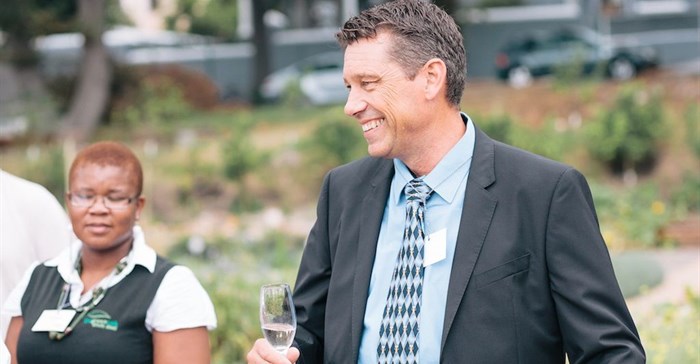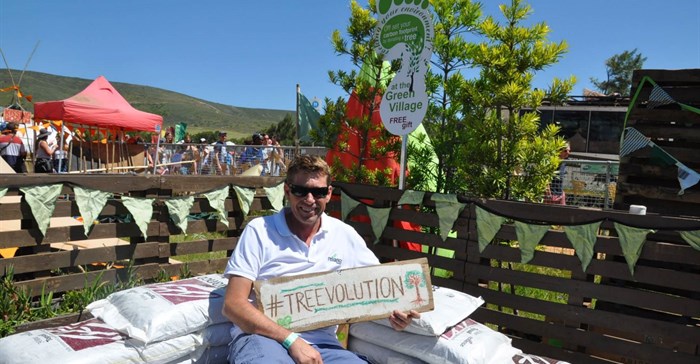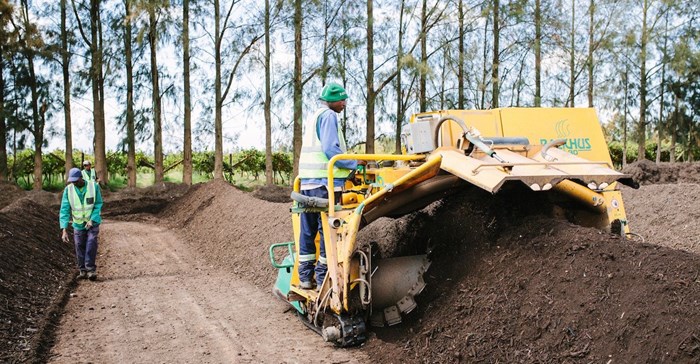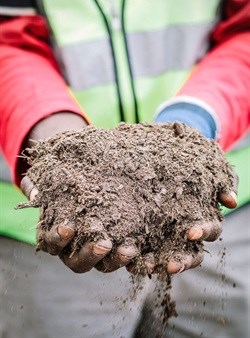Reliance Compost recently earned a gold Eco-Logic Award in the Recycling and Waste Management category, which recognises a policy, programme, or project that has demonstrably contributed to a greater public understanding and participation in waste reduction, re-use, and recycling. We chat to Reliance Compost founder and director, Eddie Redelinghuys about organic compost, growing green minds and ensuring a healthy world for future generations.

Reliance Compost Founder, Eddie Redelinghuys
Congratulations on Reliance Compost’s win at the Eco-logic Awards in the Recycling and Waste Management category! Tell us what this win means to you.
Thank you - the win is an honour. Our mission and vision are here with validated. The focus on sustainable green waste management, enriching depleted soils and growing organic food is affirmed.
What role does the Reliance team play in contributing to greater public understanding and participation in waste reduction, re-use and recycling?
The Reliance marketing team, as well as the production teams at the City of Cape Town’s drop-off and landfills, plays a vital role in creating the awareness of reducing, recycling and re-using.
Growing Green Minds: Reliance spends many days in classrooms teaching young kids about recycling and helping them to set up their very own veggie gardens. These gardens often help to support schools feeding schemes. In the classrooms, we teach kids how and why we should compost, creating little compost warriors. We often donate products to schools and NGO’s in order to aid and support their sustainable needs too.
Leaving Behind Only Footprints: At some of South Africa’s biggest events and festivals, Reliance set up green villages, educating people about their carbon footprint and impact on the environment, as well as sharing recycling initiatives. These events include Rocking the Daisies, Woordfees, Cape Getaway Show, Ride the Rhino and much more.

Image Supplied
Further question number two, tell us about the work Reliance Compost does and how it contributes to reducing climate change?
Reliance produces 100% certified organic compost from green garden refuse. Over the years it has diverted over 18m cubic metres of green material from overflowing City of Cape Town landfill sites, preventing more than a millionn tonnes of carbon dioxide gas escaping into the atmosphere – a substantial contribution to reducing the impact caused by climate change.
As one of only a few South African carbon neutral businesses, Reliance has had its composting technology approved in 2008 as a Greenhouse Gas Emission Reduction method according to the guidelines of the United Nations Framework Convention on Climate Change (UNFCCC). The company since moved across to the Carbon registry and standards. Reliance Compost is proud to have played a critical role in creating sustainable environments through composting organic waste.

Reliance Compost farm
Tell us about the company’s mission to “Grow Greener Generations”
The company does this by getting involved in the community, through sponsorships, tree-planting projects and developing communal food gardens. Together we’re improving food security, encouraging sustainable livelihoods and creating employment. Reliance starts investing at the Primary school level, carrying forward the message that every child/individual can dream and make that dream a reality if they are committed to making South Africa a better place for generations to come. No surprise either that much of the company’s income is ploughed back into the community to build sustainable environments.
You might see a bag of compost, but inside there’s much more… Every grain is life and every bag is another chance to grow, impact and change. Every bag is a bag of possibilities.
Where does your passion for organic and sustainable farming practices come from?
I am the fourth generation on my home farm and I realised that we cannot keep destroying our soils without out this leading to us destroying our own health. Since converting to organic practices, all staff on the farms have been healthier (less sick days) and the fruit we produce just tastes so much better. I believe we need to do what we can to make the world better while we're here, not strip it bare. If we treat the soil and all the living creatures with respect, then we can ensure a healthy world for the future generations.
Soil degradation is fast becoming a global issue. Why is organic compost the way to go in rehabilitating soil and how feasible is large scale production of organic compost to meet the needs of soils globally?
A certified organic compost is great, as it does not contain pollutants, but at the same time, it is important to say that any organic substance can be composted to end up being beneficial to the soils, as long as the process is controlled. Compost is simply putting back in the soils what comes from it.
Healthy good quality compost is what would be created by nature if we simply left plants to grow without interference from us. But we need to live, so we take from the soil what we need (and more), we just need to give back what we don’t use. So composting our yard-waste, food-waste, and all other organic materials are the only way to give back to the soils what it needs.
Every product that is farmed, has a waste element, and by simply turning this into compost we will create sustainable agriculture. Take forestry as an example. More than 50% of the tree is “waste” when sawed to planks. More than 50% of food that is produced is going to “waste” between the farm gate and the end consumer that excludes the 10 –30% the farmer already “culled” for perceived quality defects. It’s so easy to stick this in a landfill, but it should go back to our soils. It is very feasible to produce enough compost for large-scale production, by simply using all our organic waste.
Any place in the world that grows something has waste that needs to go back to the soils. We have intervened in the production of the product; we need to do the same in feeding the soils. Compost not only ploughs back organic matter into the soils but also brings back all the beneficial microorganisms that we could have hurt or killed off with our intensive farming methods. Compost is life.
Redelinghuys is a firm believer that living soils, alive with microbial activity and rich in organic matter, can feed plants that can, in turn, feed people and animals. He added that much of the organic waste being landfilled could also supply energy to be used as fuel. "Here at Reliance Compost, we are dedicated to replenishing the soils in and around the Western Cape through the different initiatives and projects we are involved in. I would like to invite communities to join the organic compost challenge for the future of our environment and to come and see what we are doing at Reliance."









































